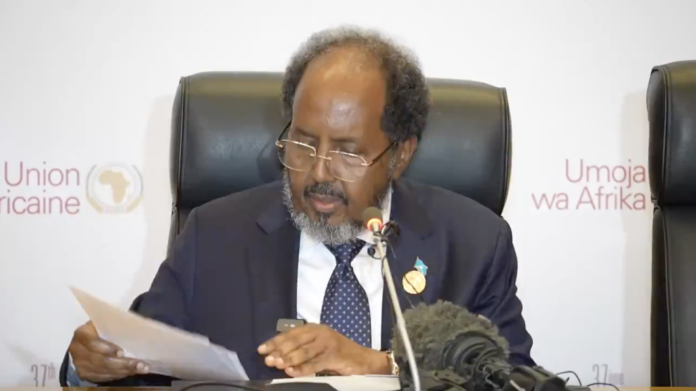The recent move by President Hassan Sheikh Mohamud (HSM) against Ethiopia, which coincides with the Puntland delegation’s visit to Addis Ababa and Puntland’s withdrawal from cooperation with the Federal Government of Somalia (FGS) in protest against the constitutional amendment:
In a surprising turn of events, Somali President Hassan Sheikh Mohamud (HSM) has taken a firm stance against Ethiopia, a move that has raised eyebrows given his previous reluctance to confront Addis Ababa’s transgressions against Somalia’s sovereignty.
The timing of HSM’s action coincides with the Puntland delegation’s visit to the Ethiopian capital earlier this month, as well as Puntland’s decision to withdraw from cooperation with the Federal Government of Somalia (FGS) in protest against the unlawful constitutional amendment pushed by HSM.
Since, the Early months of 2024, HSM has remained silent in the face of Ethiopia’s disregard for Somalia’s territorial integrity, including its offshoot Memorandum of Understanding (MOU) with the breakaway region of Somaliland and the denial of HSM’s diplomatic convoy entry into the African Union (AU) building in Addis Ababa during the last union conference. Forced to hide by Ismail Omar Guelleh, President of the tiny nation of Djibouti.
Despite these provocations, HSM chose not to retaliate, leading many to question his commitment to defending Somalia’s sovereignty. However, his sudden move against Ethiopia, which comes on the heels of the Puntland delegation’s visit and the regional state’s withdrawal from cooperation with the FGS, has raised suspicions about the true motives behind his actions.
Critics argue that HSM’s decision to confront Ethiopia now may be driven by political calculations rather than a genuine concern for Somalia’s national interests. Some suggest that his move could be an attempt to undermine Puntland’s engagement with Addis Ababa or a reaction to Puntland’s protest against the constitutional amendment.
Others question why HSM remained silent when Ethiopia displayed open disrespect for Somalia’s territorial integrity but chose to act now, when Puntland sought to engage with Addis Ababa through diplomatic channels.
Regardless of the reasons behind HSM’s actions, the situation highlights the complex web of regional dynamics and power struggles within Somalia and the broader Horn of Africa region. It also underscores the need for a coherent and principled foreign policy that prioritizes Somalia’s sovereignty and national interests above short-term political calculations.
As tensions continue to simmer, all eyes will be on how HSM navigates this delicate situation and whether his actions will ultimately serve to protect Somalia’s territorial integrity or further exacerbate regional tensions.
HSM’s sentiments towards Puntland, the constitutional amendment controversy, his failed offensive against Al-Shabaab, and the international community’s silence:
HSM’s actions against Ethiopia are further complicated by allegations that he harbors personal resentments towards Puntland, not only against the region’s political leadership but also against its people. Critics argue that HSM’s move may be driven by a desire to undermine Puntland’s autonomy and influence, rather than a genuine concern for Somalia’s national interests.
Puntland, on the other hand, has been clear in its stance against the unconstitutional amendment pushed by HSM, which many view as a blatant abandonment of the agreed-upon power-sharing structure and a hijacking of the Somali people’s dream of holding free and fair “one person, one vote” elections.
Furthermore, HSM’s failure to remove Al-Shabaab from the main southern and central regions, despite initiating a battle against the group without strategic alignments or a comprehensive plan, has raised questions about the effectiveness of his administration’s counterterrorism efforts.
It remains a puzzling enigma as to what became of the financial and military logistics mobilized during the initial phase of the war against Al-Shabaab. Many are left wondering about the fate of the weapons packages intended for states like Puntland, Jubaland, Southwest, and Hirshabelle, which were also aimed at achieving the goal of removing Al-Shabaab from their territories.
Concerns have also been raised about the weapons provided to tribal militias, which were not up to the task and instead used the arms to engage in internecine conflicts, forcing other tribes to abandon their lands.
Despite HSM’s efforts to confuse the public and use the national television to spread misinformation about the war against Al-Shabaab, many questions remain unanswered regarding the mismanagement and lack of accountability surrounding the offensive.
Notably, the international community has maintained a deafening silence, failing to hold HSM liable for the misuse of financial and logistical resources provided to support the counterterrorism efforts. This silence raises questions about the level of scrutiny and oversight applied to the Somali government’s actions, particularly in the realm of security and conflict resolution.
As tensions continue to escalate, it becomes increasingly clear that HSM has much to answer for – from his administration’s handling of the Al-Shabaab offensive to the controversial constitutional amendment and his seemingly erratic foreign policy decisions. The international community’s failure to demand accountability only serves to perpetuate the cycle of instability and mistrust that has plagued Somalia for decades.


